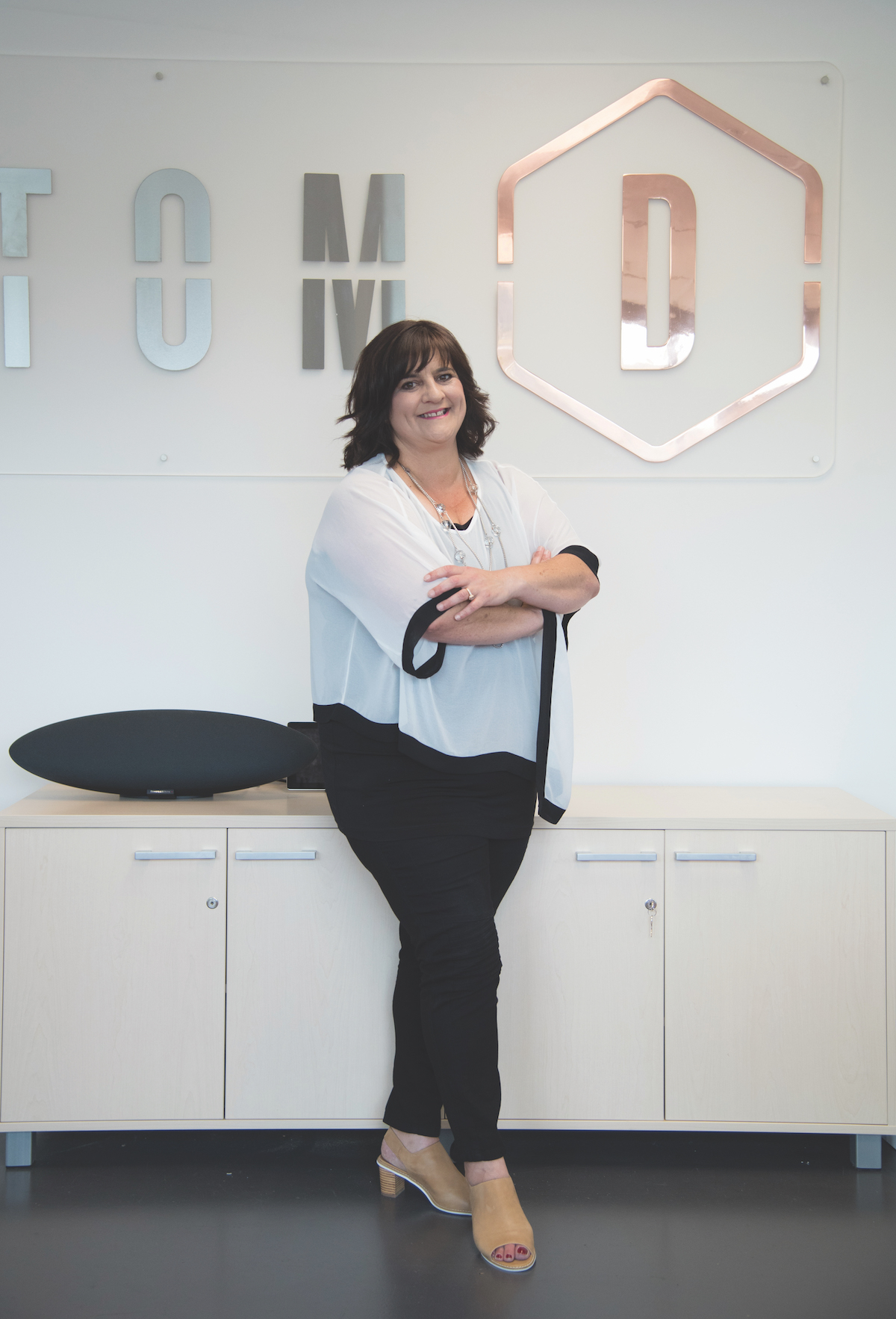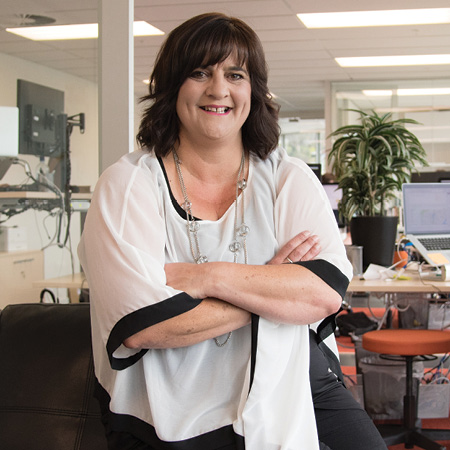Julie Ryan, Managing Director of web-development business Custom D, “fell into” the technology industry while working her way up from administrative roles to the top of the ladder. Without a technical background, it was a steep learning curve trying to understand the terminology, but she pulled it off with aplomb. “In every single job I’ve ever been involved in, I’ve always pushed very hard and progressed myself each time,” she explains.
Formerly the operations manager at Digital Fusion, a company that specialises in developing custom iOS and Android apps using the FileMaker platform, Julie stepped into her current role 2 years ago when Custom D became a separate entity. The decision was made to divide the business after an increasing number of clients began clamouring for online tools to complement the FileMaker apps.
“Customers either wanted to take some of the services online or create a portal for their clients. So we started adding the odd web developer to the team, and then that whole aspect of the business started to grow and become its own thing,” says Julie. “It was a case of figuring out how to make the most of that team. So we decided to split the business in half, and that’s how Custom D came about.”
The office where the buck stops

She describes the past 2 years in the role of managing director as a period of “enormous personal development”. As a straight-talking person with high expectations, Julie has had to massage her management skills to develop a leadership style that brings out the best in people. When she discovered her team wasn’t feeling valued or supported, Julie realised she needed to be more understanding and involved. “Sometimes you have to force yourself to put away your natural tendencies, to be more empathetic towards the people you’re working with so that they can actually do better work, because ultimately that’s what you want.”
She was also new to feeling solely accountable for the outcomes and success of a business. While Julie had plenty of responsibility in previous management roles, it was certainly an adjustment to become the person in charge making the final decisions. She confesses, “I was somewhat naïve about the switch from senior management to managing shareholder. This was my first time at being in the office where the buck stops.”
That’s not to say that Julie hasn’t risen to, and enjoyed, the challenge. One of her favourite parts of the job is seeing the difficult decisions pay off. “Sometimes you talk about it and you think about it, but if you don’t effectively introduce changes, then it’s very difficult to see any difference in the outcome,” she elaborates. “When you really commit to changes in approach and process, you see just what kind of benefit they have — not only for us as an organisation, but also for our people and our clients. It’s fantastic.”
Teething problems
One of the key changes Julie saw the need to introduce was a switch in focus from billable hours, budgets and revenue to simply building great online solutions for clients. As a start-up of sorts, with a “fairly green” management team, Custom D had some teething problems at the beginning.
“We had a good stable of clients, but the work was unreliable and erratic. Sales were lumpy; we didn’t have a niche or vertical market, which meant we struggled to get new clients and projects,” explains Julie. “We had systems, but they were incomplete and didn’t work end to end. And while we talked loftily about building a reputation for producing high-quality work, in practice all focus was on simply keeping our head above water.”

This led to unhappy clients, disengaged staff and a stressful work environment. Moreover, Julie says, buggy products and communication failures meant Custom D had difficulty attracting new business. “Understandably, we weren’t getting much in the way of referrals,” she admits. Julie realised something had to give. “About a year ago, we started changing everything,” she says. “Fundamentally and deliberately, we moved away from a financial focus and talked more about what we were doing for our clients.”
The company worked on enhancing communication both internally and externally. It introduced team messaging app Slack, which made “conversation between developer and client free-flowing, relaxed, efficient and effective.” Client relations significantly improved as a result. Custom D also better developed a project management structure and quality-control practices. A senior team member was persuaded to step into a supervisory role, and the additional support made developers happy, while added code checking and peer review processes made for more reliable products and satisfied customers.
Building the client base
Now the emphasis for Custom D is on building up its client base. Although happier clients have led to more work and new referrals, the company has yet to find its niche in the market. Julie says convincing new clients to come onboard can be tough because not everyone realises the impact that efficient internal and external online systems can have on the growth and prosperity of a business.
“In such a transient world of employment, staff retention is hugely important, so if you can do things that make your staff happier and their job more enjoyable, then it’s going to benefit your organisation.” – Julie Ryan
“You need to make an investment in better systems, because using an antiquated, inefficient or problematic system is frustrating and takes some of the pleasure away from your work. In such a transient world of employment, staff retention is hugely important,
so if you can do things that make your staff happier and their job more enjoyable, then it’s going to benefit your organisation.”
She adds that it’s equally important to have user-friendly online tools for customers to access. “Businesses are always looking to get that edge. When customers are accessing companies online, the ones they want to go back to and use are the ones that have
really good sites which are easy to interact with.”
Room to grow
Ultimately, Julie says, the technology industry is “still pretty immature,” so it can be prone to confusion and misunderstanding. “I think that sometimes there’s a misconception that technology companies are just big cash cows and that anyone in the industry is all but guaranteed millionaire or billionaire status. But it’s just not like that. We’re essentially no different to any other professional service where you’re billing your time,” she says. “It’s still an industry with so much jargon in it that people still don’t really understand it. There’s so much all wrapped up in the word ‘technology’ that to actually try to disseminate that in a way that’s meaningful without overwhelming people is quite difficult.”
But when Julie looks ahead, she sees growth in the company’s future. Custom D is working on rolling out a customisable task-management system, based on a very successful project for Australian industrial design firm Design + Industry. With fantastic developers making great online tools, the end user always in mind, and a focus on quality, Custom D has
a lot to offer its customers.
“We’re not here to be the biggest or the coolest company in town. What we want is to be the company producing the best work for our clients.”

